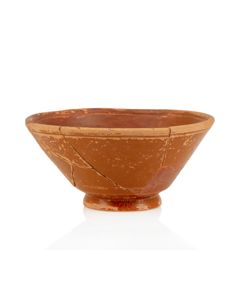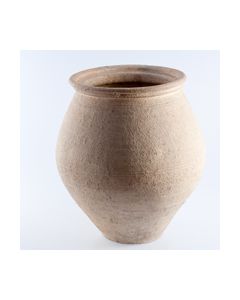Search results for: 'For'
-
 Roman double head flask
Roman double head flaskRare type of a head vessel with faces of a young man or boy. Gorgeous blue pigmented glass.
Price: on request Roman glass cup
Roman glass cupGlass vessel dating to the 1st century AD. Beautiful iridescent patina. From the professor Ritschel collection.
Price: on request Late Roman glass flask
Late Roman glass flaskVery rare type of vessel from the 4th to 5th century AD. From the professor Ritschel collection.
Price: on request Egyptian mummy beads necklace
Egyptian mummy beads necklaceModern assembled and threaded necklace made from original ancient Egyptian beads. The socalled mummy beads are made of faience and date to the Late Period of ancient Egypt.
Price: on request Ushabti with interesting inscription
Ushabti with interesting inscriptionNicely painted Egyptian funerary statuette from the Ramesside Period.
Price: on request Roman Terra Sigillata cup from the Rhineland with mark PASSENI
Roman Terra Sigillata cup from the Rhineland with mark PASSENIFrom the workshop of Passenus. Found near the Roman city of Novaesium, today's Neuss in Germany, an early Roman foundation and with this one of the oldest cities in Germany.
Price: on request Egyptian bronze figurine of Horus the Child
Egyptian bronze figurine of Horus the ChildAmulet of the child god in half-seated position. In Egyptian mythology his mother protected him by powerful spells. This protection should be extended to the wearer.
Price: on request Paleolithic hand axe
Paleolithic hand axeSmall prehistoric stone tool. It was the universal tool of the older Stone age and could be used as a borer or a cutter. From a 100 year old museum collection.
Price: on request Paleolithic hand axe
Paleolithic hand axeSmall prehistoric stone tool. It was the universal tool of the older Stone age and could be used as a borer or a cutter. From a 100 year old museum collection.
Price: on request Paleolithic hand axe
Paleolithic hand axePrehistoric stone tool. It was the universal tool of the older Stone age and could be used as a borer or a cutter. From a Swiss museum collection. Found in Ouarzazate, Morocco.
Price: on request Paleolithic hand axe
Paleolithic hand axeSmall prehistoric stone tool. It was the universal tool of the older Stone age and could be used as a borer or a cutter. From a 100 year old museum collection.
Price: on request Paleolithic hand axe
Paleolithic hand axePrehistoric stone tool. It was the universal tool of the older Stone age and could be used as a borer or a cutter. From a Swiss museum collection. Found in Algeria, North Africa.
Price: on request Paleolithic hand axe
Paleolithic hand axePrehistoric stone tool. It was the universal tool of the older Stone age and could be used as a borer or a cutter. From a Swiss museum collection. Found in Algeria, North Africa.
Price: on request Large prehistoric hand axe
Large prehistoric hand axeMassive Paleolithic stone tool. It was the universal tool of the older Stone age and could be used as a borer or a cutter. From a Swiss museum collection. Found in Algeria, North Africa.
Price: on request Paleolithic hand axe
Paleolithic hand axePrehistoric stone tool. It was the universal tool of the older Stone age and could be used as a borer or a cutter. From a Swiss museum collection. Found in Morocco, North Africa.
Price: on request Huge Paleolithic hand axe
Huge Paleolithic hand axePrehistoric stone tool. It was the universal tool of the older Stone age and could be used as a borer or a cutter. From a Swiss museum collection. Found in Morocco, North Africa.
Price: on request Paleolithic hand axe
Paleolithic hand axePrehistoric stone tool. It was the universal tool of the older Stone age and could be used as a borer or a cutter. From a Swiss museum collection. Found in Morocco, North Africa.
Price: on request Large paleolithic hand axe
Large paleolithic hand axePrehistoric stone tool made of wonderfully banded stone. It was the universal tool of the older Stone age and could be used as a borer or a cutter. From a Swiss museum collection. Found in Morocco, North Africa.
Price: on request Ushabti of the 22nd dynasty
Ushabti of the 22nd dynastyRemarkable Egyptian funerary statuette made of green faience with black paint. Probably from Tanis and made during the 22nd dynasty.
Price: on request Small shabti
Small shabtiNice turquoise faience figurine with black paint. From the 22nd to 25th dynasty of ancient Egypt.
Price: on request Small Egyptian ushabti
Small Egyptian ushabtiFunerary statuette from the Third Intermediate Period of ancient Egypt. Orange-brown clay with green faience.
Price: on request Two large Roman clay pots
Two large Roman clay potsImpressively large vessels from the Roman Imperial period. Both are finds from the Roman city of Novaesium, today's Neuss in Germany.
Price: on request Two large Roman clay bowls
Two large Roman clay bowlsImpressively large vessels from the Roman Imperial period. Both are finds from the Roman city of Novaesium, today's Neuss in Germany.
Price: on request Roman key ring
Roman key ringFinger ring made of bronze with a key. From the Roman Imperial period, around the 2nd century. A find from the Roman city of Novaesium, today's Neuss in Germany.
Price: on request Roman legionary roof tile from the Rhineland
Roman legionary roof tile from the RhinelandFound 1966 till 1981 near the Roman city of Novaesium, today's Neuss in Germany. Novaesium was an early Roman foundation and with this is one of the oldest cities in Germany.
Price: on request Two Roman bowls found in the Rhineland
Two Roman bowls found in the RhinelandOne of the bowls with exactly known finding spot and years. Both found near the Roman city of Novaesium, today's Neuss in Germany. Novaesium was an early Roman foundation and with this is one of the oldest cities in Germany.
Price: on request Roman iron spear head from the Rhineland
Roman iron spear head from the RhinelandFound near the Roman city of Novaesium, today's Neuss in Germany, an early Roman foundation and with this one of the oldest cities in Germany.
Price: on request Roman iron pilum (javelin) head from the Rhineland
Roman iron pilum (javelin) head from the RhinelandFound near the Roman city of Novaesium, today's Neuss in Germany, an early Roman foundation and with this one of the oldest cities in Germany.
Price: on request Roman lead weight from Novaesium
Roman lead weight from NovaesiumTrapezoidal weight from the Roman city of Novaesium, today's Neuss in Germany.
Price: on request Three arrow heads
Three arrow headsTwo bronze arrow heads from the 1st Millenium AD. One stone arrow head from the Neolithic.
Price: on request Imposing elamite ceramic spouted jar
Imposing elamite ceramic spouted jarThe jar has a biconical body and a spout in form of a stilized bird's head. From ancient Iran at the beginning of the 1st Millenium BC.
Price: on request Riesige römische Graburne
Riesige römische GraburneVollständig erhalten, Höhe 300mm, Duchmesser 270mm.
Price: on request Clay ushabti
Clay ushabtiTall Egyptian funerary statuette from the New Kingdom. From the collection of the archaeologist and artist Erich Charlier.
Price: on request Roman terracotta bottle from the Rhineland with painted inscription
Roman terracotta bottle from the Rhineland with painted inscriptionThe insciption TIBI A ME in intense white color is perfectly preserved. Found near the Roman city of Novaesium, today's Neuss in Germany, an early Roman foundation and with this one of the oldest cities in Germany.
Price: on request Four Greek or Scythian arrow heads
Four Greek or Scythian arrow headsGroup of four bronze socketed arrowheads, mainly triangular cross-section. Excellent condition, beautiful patina. From an old German collection, acquired in the early 1980s.
Price: on request Four Greek or Scythian arrow heads
Four Greek or Scythian arrow headsGroup of four bronze socketed arrowheads, mainly triangular cross-section. Excellent condition, beautiful patina. From an old German collection, acquired in the early 1980s.
Price: on request

